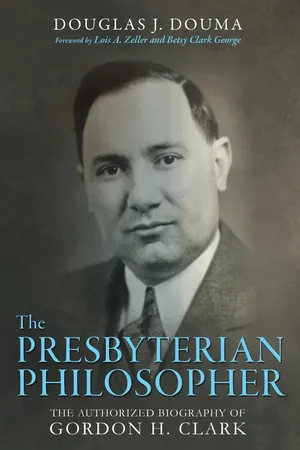![]()
Chapter 1
The Presbyterian Heritage of Gordon Clark
Clark—an English surname ultimately derived from the Latin clericus meaning “scribe,” “secretary,” or a scholar within a religious order, referring to someone educated.
Gordon Haddon Clark (1902–1985) was born into the Christian tradition of Old School Presbyterianism. Known for requiring ministers to subscribe to the system of Protestant Christian doctrine contained in the Westminster Confession of Faith (1646), Old School Presbyterianism shaped Clark’s understanding of the world. In his career as a theologian and a Christian philosopher, Clark defended the Confession and sought to keep his own philosophical views in line with its teachings. In fact, it could be said that he was a philosopher of the Westminster Confession, truly a Presbyterian philosopher.
Historical circumstances initially set Clark on this course. In fact, he was the son of a Presbyterian minister who, in turn, was the son of a Presbyterian minister. For two generations then, starting with his paternal grandfather, James Armstrong Clark (1831–1894), Presbyterian ministry was of central importance to the family. While Gordon Clark never met his grandfather, who died before Gordon was born, he did travel as a child with his parents to visit relatives in western Pennsylvania where the family had lived since shortly after James arrived from Scotland in 1854.
Digging into the Clark family line, we can see how he inherited the Christian doctrines that shaped the core of his thought. Basic knowledge of his grandfather, James Clark, survives in a fifteen-page handwritten autobiography written sometime in the late nineteenth century. Because the content of the autobiography ends abruptly in 1858, and other sources on his life are scant, we can only piece together the basic contours of James’ life. What we do know shows that he was deeply committed to the Presbyterian faith. James was born December 4, 1831, to William Baldwin Clark (1791–1858) and Jean Armstrong (1796–18??) in Hawick, Scotland, and baptized at Hawick’s East Bank Associate Church. As a child, he was affected by the Disruption of 1843, which fractured the established Church of Scotland. In this seminal event in Presbyterian history, some 450 ministers of the church’s total of 1,200 ministers broke away and formed the Free Church of Scotland. The secession came as a response to the state’s encroachment upon the spiritual affairs of the church. Although James was only twelve years of age at the time of the Disruption, he recalled in his autobiography that at that time he had “religious impressions & dispositions” and “took sides against the establishment.” By the time he was fourteen years of age he had “taken sides with the Calvinist docs” and “made a fair offer in argument on the five points [of Calvinism].” Soon after the Disruption, James’s parents chose to join a Free Church congregation and James’s father, William, was elected as an elder. A few years later, James left home to attend the Free Church Normal College in Edinburgh. Following his graduation, he became a teacher at the Free Church Normal School in Yarrow, Scotland (1851–1854).
Historical knowledge of Presbyterianism came to Gordon Clark through family stories of the church in Scotland and in the United States. In fact, for generations, Clark family history was largely tied up with the history of the church. Although Gordon Clark’s grandfather James arrived on American shores in 1854, James’s brother Will had preceded him by a few years. Will found in the United States a “very large field of usefulness” for the ministry. Inspired by the potential for ministry in the U.S., James resigned his teaching position in Scotland and followed his brother’s path across the ocean. On April 24, 1854, just weeks prior to leaving Scotland, James married Margaret Scott (1835–1881), satisfying his mother’s wish that he would not emigrate alone. Once in the United States, he taught bookkeeping and was the principal of a business college which he owned and operated in Philadelphia for a year before selling its assets and returning to college as a student. He enrolled first at Franklin College in Ohio, but left in 1855 to attend Allegheny Seminary where he studied theology, graduating in 1858. Upon his arrival in the U.S., James joined the Associate Presbyterian Church, an ethnically Scottish denomination with roots reaching back over a century in the United States. When, in 1858, this church merged with other Scottish Seceder and Covenanter churches in America to form the United Presbyterian Church of North America (UPCNA), James, who had been licensed to preach in the Associate Presbyterian Church in 1857, joined the new body in short order and was ordained in 1859. He preached for the remainder of his life in the UPCNA at a number of churches in Butler County, Pennsylvania. After the death of his first wife, Margaret Scott, in 1881, James married Frances N. Wilson in 1884. In total, he had two daughters and seven sons.
Among the children born to James Armstrong Clark and his first wife Margaret Scott was the father of Gordon Clark, David Scott Clark (1859–1939). Although few records remain providing details of David’s early life, it is possible to provide a basic outline of his academic track. According to United Presbyterian Church records, David graduated in 1884 from Mount Union College in Ohio, received an M.A. from the same college in 1886, and was awarded an honorary DD in 1908. He also studied at Princeton Theological Seminary (1883–1885), as well as at the Free Church College in Edinburgh (1885–1886), before returning to Princeton where he graduated in 1887 with a Master of Divinity degree.
David’s learning would prove influential in Gordon Clark’s upbringing. David equipped his son with a set of competencies that other young students would not learn until seminary, including knowledge of Presbyterian history, church doctrine, and the nature of recent events in the church. From his fathe...
